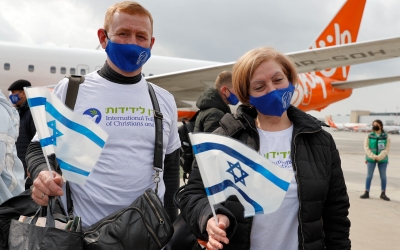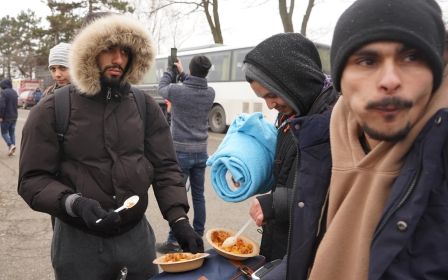Russia-Ukraine war: Invasion leaves Israeli IVF patients in limbo

As Russian tanks rolled into Ukraine, Michal* watched from 3,000 kilometres away as her longtime dream of becoming a mother appeared to slip away.
The 42-year-old, who declined to use her real name, is one of an increasing number of Israelis working with Ukrainian fertility clinics with the goal of getting pregnant but avoiding long waits and high costs.
New MEE newsletter: Jerusalem Dispatch
Sign up to get the latest insights and analysis on Israel-Palestine, alongside Turkey Unpacked and other MEE newsletters
Sperm is sent from Israel to Ukraine where it is used to fertilise donor eggs and then, a couple of weeks later, the frozen embryos arrive in Israel, eventually to be transferred into the uterus of a hopeful mother.
Michal turned to Ukraine after years of trying to have baby through a variety of other methods including hormone injections.
But with the ongoing bombardment and siege of cities across Ukraine, the best-laid plans - plans that were supposed to take at least some of the challenges out of getting pregnant - are now subject to a whole new set of risks.
"I tried all the ways to get pregnant. It was my last chance and what happened just broke me. I can't stop crying," said Michal, wringing her hands with frustration. "Putin controls my womb."
Michal said in mid-February she had sent sperm to a clinic in Lviv, a city in western Ukraine. So far, the city has largely been spared from air strikes and is hosting diplomats who fled the capital Kyiv. But she has no idea what could happen next.
"I want to be a mother and I find difficulties and obstacles in the way all the time. But I didn’t imagine this one," she said. "This war affected me in the most vulnerable and sensitive place."
'Hoping, wanting, praying'
Ukraine has become a popular destination for those trying to conceive or use surrogates to carry their embryos because it is more affordable than other countries offering the same services.
In Israel, a cycle of IVF would normally take at least a year to organise. Eggs are in high demand particularly because Israeli customers only use Christian donors in their attempts to avoid genetic diseases due to Jewish intermarriage.
Working with Israeli medical facilities that partner with Ukrainian clinics, time is cut to three months and the cost is between $10,000 and $13,000, significantly less than local costs.
In recent years, collaborations between Israeli and Ukrainian clinics became even easier, as they started offering egg donor services that don't require travel.
'We are hoping, wanting and praying that the war will stop and that our team...will go through it in peace and live'
- Manor Medical Center representative
That ease, however, seems to be in question, following the Russian invasion of Ukraine last week.
A representative with the Tel Aviv-based Manor Medical Center, one of the facilities in Israel working with fertility clinics in Ukraine, said she and her staff were trying to reassure their patients - even as the situation remains precarious for egg donors and clinicians on the ground.
Over 60 percent of egg donations from Ukraine are processed through the Manor Center, which has offices in Kyiv and Kharkiv, both of which have been bombed over the past week. The office in Kyiv has been closed with operations continuing in Georgia, Manor told customers last week.
"Right now, we are hoping, wanting and praying that the war will stop and that our team, including our women donors who are the most precious things to our hearts, will go through it in peace and live," said the representative who gave her name as Tali Manor. "This is our priority. After that, we will know what to do."
Hadar, an administrator who oversees operations for the Moms Project Company, which is based at Assuta Hospital in Tel Aviv, said the Lviv clinic with which they work is still operating for now, but on a limited basis.
"Much will depend on the outcome of this war. No one can say what will happen," said Hadar, who declined to give her last name when MEE reached her by phone. "People are under pressure and, of course, this is affecting egg donations."
For Michal, sitting in Tel Aviv, the anxiety over the conflict is immense. "I contacted the medical centre that is dealing with my case and they didn't reply for days, which added to my stress," she said.
When they did reply, she said they told her they believe everything will be alright. But for now, she believes no one really knows, so her wait will continue.
*An assumed name has been used to protect this source's identity
Middle East Eye delivers independent and unrivalled coverage and analysis of the Middle East, North Africa and beyond. To learn more about republishing this content and the associated fees, please fill out this form. More about MEE can be found here.





